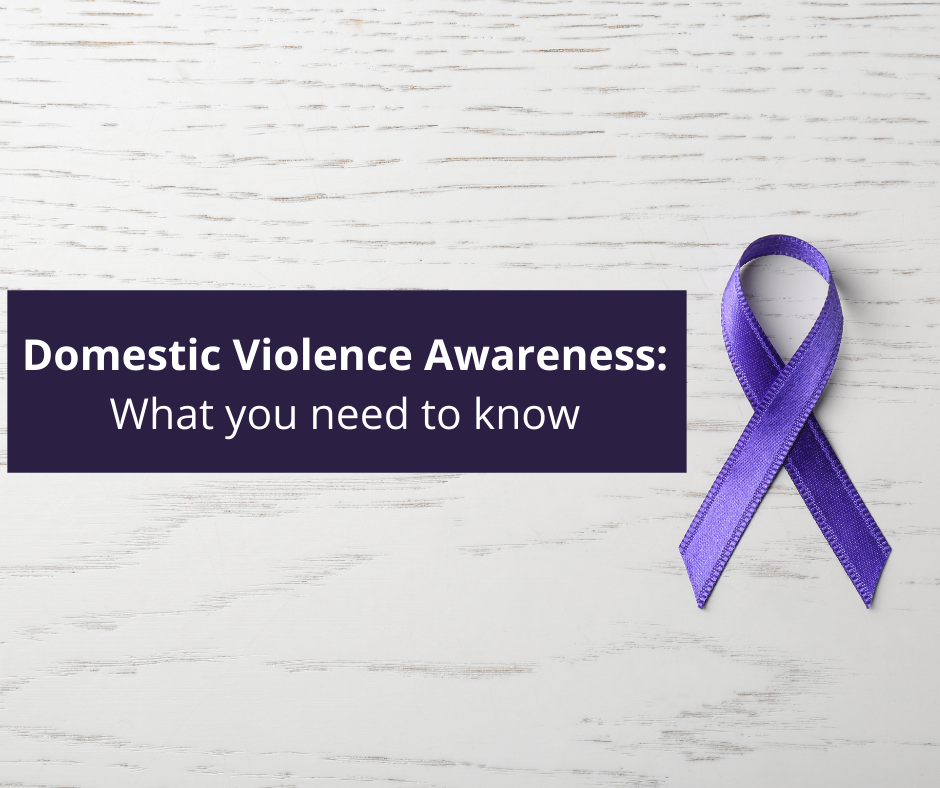Domestic Violence Awareness: What you need to know

Each year, the month of October is dedicated as National Domestic Violence Awareness Month to raise awareness of domestic abuse, provide those affected with resources, and show family and friends how to help loved ones stay safe. Domestic violence is a pattern of behaviors and control by one person to gain and maintain power over another person and includes physical and emotional abuse.
Who experiences domestic violence?
Anyone can be a victim of domestic violence. In the United States, 1 in 4 women and 1 in 9 men experience sexual abuse, physical abuse, and/or stalking by a current or past partner in their lifetime (CDC, 2017). Although domestic violence can happen to anyone, the burden of domestic violence is not shared equally, with women and many racial/ethnic and sexual minority groups being disproportionately affected. Domestic violence affects all levels of family and community and leads to an increase in symptoms of depression, anxiety, and other physical distress caused by trauma and abuse.
The effect of COVID-19
Due to COVID-19 and the public health measures designed to slow the spread of the virus, increased stressors in relationships and families have escalated the incidence of domestic abuse. Even as restrictions continue to be lifted, the threat of domestic violence continues.
Here are some signs that you or someone you love may be in an abusive relationship.
- Your partner has hit you, beat you, or strangled you in the past or has destroyed your belongings or your home.
- Your partner puts you down. They attack your intelligence, looks, mental health, or capabilities – such as your parenting. They blame you for their actions and tell you nobody else will want you if you leave. Insulting, demeaning, or shaming you in front of other people are other signs of abuse from a partner.
- Your partner threatens you or your family. This includes threatening to harm or take away your children or pets as well as intimidating you through threatening looks, actions, or with weapons.
- Your partner physically and sexually abuses you. If they ever push, shove, or hit you, or pressure you to have sex with them when you don’t want to, they are abusing you – even if it doesn’t happen all the time.
- Your partner is possessive. They check up on you constantly wondering where you are; they get mad at you for hanging out with certain people or if you don’t do what they say. Furthermore, they prevent you from making your own decisions and control finances in the household including taking your money or refusing to provide money for needed expenses.
- Your partner is jealous. A small amount of jealousy is normal and healthy; however, if they accuse you of being unfaithful or isolate you from family or friends, that means the jealousy has gone too far. Additionally, they show extreme jealousy of time spent away from them and prevent or discourage you from spending time with them.
No one deserves to be abused. If you or someone you love is a victim of abuse, know that you are not alone. Lorenz Clinic can provide support for individuals who are experiencing abuse. Domestic Violence is preventable through education and adequate support.
Additional Resources
For other resources and support on domestic violence, visit the National Domestic Violence Hotline – a 24/7, confidential, and free resource for victims. In addition to phone calls, chat is available as well.
Source: